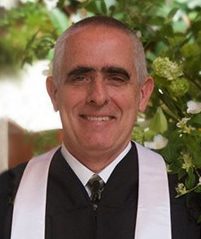Rosh Hashanah arrives this year at sunset on Oct. 2. Nine days later, at sunset on Oct. 11, the gathering shadows of Yom Kippur will settle over our souls.
And halfway between those two sacred sunsets, the sun will rise on Oct. 7, the first anniversary of the worst day of violence against the Jewish people since the Holocaust, a day for all of us to stand with Jewish people throughout the world by standing against antisemitism in all its forms.
Two things can be true, as the popular adage affirms. In this case, it is true that there is much to lament and oppose concerning the violence and suffering which has come to thousands of innocent Palestinians as a result of Israel’s efforts to defeat the Hamas perpetrators of October 7, and it is also true that the High Holy Days of 2024 call all people of all faith traditions and political persuasions to the side of our Jewish neighbors and friends as a global act of both solidarity and repentance.

Chuck Poole
To assume that we cannot stand with both the suffering Jews and the suffering Palestinians would be to stumble into the false choice of the exaggerated option.
When it comes to our Jewish ancestors, we Christians have much for which to repent. Centuries before Hitler forced Jews into ghettos in the mid-20th century, the church used its power to segregate and oppress Jews — including that dreadful moment when, in July 1555, Pope Paul VI mandated all Jews must be confined to closed-off neighborhoods with only one entrance.
This version of the Jewish ghetto, which predated Hitler by nearly four centuries, was itself predated by the violence of the Crusades, the oppression of the Inquisition and the voices of some Christian preachers, among them, Martin Luther who, in 1543 wrote, “The Jews and Their Lies,” in which he called for synagogues and the homes of Jews to be burned to the ground, declaring “a true Jew” to be “Christianity’s worst enemy, next to the devil.”
How did this happen? How could Christianity, a spiritual offspring of Judaism, become the cradle of violent religious hatred toward the Jews?
Our Lord Jesus was himself a Jew, not only at his birth but also at his death. (A Jew who, as far as we know, never mentioned starting a new world religion called Christianity.)
The church was birthed in the synagogue and is forever indebted to the Judaism which first formed us. As others have said, “Christianity is a form of Judaism” and “Christians are honorary Jews” echoes of Paul’s passionate reminder that we non-Jews are “the late limbs grafted onto and into the original tree” of Judaism. (See Romans 11:17-2.4)
“Christian oppression of Jews (is) among the most inexplicable institutional sins in all of human history.”
All of which makes Christian oppression of Jews among the most inexplicable institutional sins in all of human history.
It was, one imagines, our early need to blame the Jews for the crucifixion of Jesus, coupled with our sad longing for the cultural hegemony of religious onlyism, fueled by our less-than-thoughtful use of certain Gospel passages (Matthew 27:25, John 9:22,19:7 and 20:19, for example) that first turned us toward the persecution and oppression of the Jews.
These High Holy Days might be an especially good and important moment for us to sit truthfully with the pain of Christianity’s contributions to the persecution of Jews across the centuries, own that historical responsibility, ask forgiveness, and think, especially tenderly, of our local synagogue during this sacred season, which this year will be marked in the middle by a global version of what is called in Judaism the yahrzeit.
“Yahrzeit,” which means “the passing of a year,” is the Jewish word for the anniversary on the Hebrew calendar of the death of a loved one, a word which in this moment might gently expand to tenderly embrace the global grief of the first anniversary of Oct. 7, 2023.
Oct. 7, 2024, is a painfully tender version of a yahrzeit to hold in our hearts, a small way of keeping faith with the global grief of a tragic anniversary that will mark the center of this deeply sacred season for our Jewish neighbors and friends.
Chuck Poole retired in 2022 after 45 years of pastoral life, during which he served churches in Georgia; North Carolina; Washington, D.C.; and Jackson, Miss. He has served as a visiting preacher and teacher on the campuses of multiple universities, seminaries and divinity schools. He was the founding teacher of the Wood Street Bible Class in Jackson, which he led for 21 years. The author of nine books, numerous published articles, one gospel song and the lyrics to three hymns, Chuck has served as a “minister on the street” and as an advocate for interfaith conversation and welcome. He and his wife, Marcia, now live in Birmingham, where he serves on the staff of Together for Hope.


